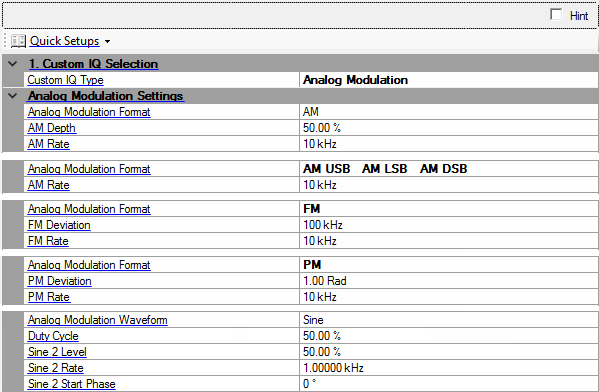

Use this ![]() drop-down menu to select a modulation type from several supported formats. A single data segment using that modulation type appears in the segment list below. Click the cell in the Constellation column to open the Constellation Setting window, providing a graphical display and editing features (video). Quick setups enable you to configure complex signals for signal generation, equivalent to 89600B VSA setups in signal analysis.
drop-down menu to select a modulation type from several supported formats. A single data segment using that modulation type appears in the segment list below. Click the cell in the Constellation column to open the Constellation Setting window, providing a graphical display and editing features (video). Quick setups enable you to configure complex signals for signal generation, equivalent to 89600B VSA setups in signal analysis.
DVB-S2 and DVB-S2X quick setups also add a PLHEADER segment before the data segment, as defined in the standard.
Quick Setups IQ Settings
|
Standard |
Modulation |
Symbol Rate |
Filter |
|
|---|---|---|---|---|
|
DVB-S2 |
QPSK |
|
1.0 Msps |
RNYQ (0.5) |
|
8PSK |
|
|||
|
16APSK |
4+12APSK 2/3, 4+12APSK 3/4, 4+12APSK 4/5, 4+12APSK 5/6, 4+12APSK 8/9, 4+12APSK 9/10 |
|||
|
32APSK |
4+12+16APSK 3/4, 4+12+16APSK 4/5, 4+12+16APSK 5/6, 4+12+16APSK 8/9, 4+12+16APSK 9/10 |
|||
|
DVB-S2X |
QPSK |
|
1.0 Msps |
RNYQ (0.5) |
|
8PSK |
|
|||
|
8APSK |
2+4+2APSK 100/180, 2+4+2APSK 104/180 |
|||
|
16APSK |
4+12APSK Normal 26/45; 4+12APSK Normal 3/5; 4+12APSK Normal 28/45; 4+12APSK Normal 23/36; 4+12APSK Normal 25/36; 4+12APSK Normal 13/18; 4+12APSK Normal 140/180; 4+12APSK Normal 154/180; 4+12APSK Short 7/15; 4+12APSK Short 8/15; 4+12APSK Short 26/45; 4+12APSK Short 3/5; 4+12APSK Short 32/45; 8+8APSK Normal 90/180, 96/180, 100/180; 8+8APSK Normal 18/30; 8+8APSK Normal 20/30 |
|||
|
32APSK |
4+12+16APSK Normal 2/3, 4+12+16APSK Short 2/3, 4+12+16APSK Short 32/45, 4+8+4+16APSK 128/180, 4+8+4+16APSK 132/180, 4+8+4+16APSK 140/180 |
|||
|
64APSK |
16+16+16+16APSK 128/180, 8+16+20+20APSK 7/9, 8+16+20+20APSK 4/5, 8+16+20+20APSK 5/6, 4+12+20+28APSK 132/180, |
|||
|
128APSK |
128APSK 135/180, 128APSK 140/180 |
|||
|
256APSK |
256APSK 116/180, 256APSK 124/180, 256APSK 128/180, 256APSK 135/180, 256APSK 20/30, 256APSK 22/30 |
|||
|
APCO25 |
C4FM |
4FSK (0.6 kHz, 1.8 kHz, -0.6 kHz, -1.8 kHz) |
4.8 ksps |
NYQ (0.2) + 1/Sinc |
|
CQPSK* |
Pi/4 DQPSK |
4.8 ksps |
NYQ |
|
|
HCPM |
4FSK (1 kHz, 3 kHz, -1 kHz, -3 kHz) |
6 ksps |
APCO25 HCPM |
|
|
HDQPSK |
Pi/4 DQPSK |
6 ksps |
APCO25 HDQPSK |
|
|
TETRA |
Pi/4 DQPSK |
18 ksps |
RNYQ (0.35) |
|
|
NXDN |
4800 bps |
4FSK (0.35 kHz, 1.05 kHz, -0.35 kHz, -1.05 kHz) |
2.4 ksps |
RNYQ (0.2) + Sinc |
|
9600 bps |
4FSK (0.8 kHz, 2.4 kHz, -0.8 kHz, 2.4 kHz) |
4.8 ksps |
RNYQ (0.2) + Sinc |
|
|
dPMR |
4FSK (0.35 kHz, 1.05 kHz, -0.35 kHz, -1.05 kHz) |
2.4 ksps |
RNYQ (0.2) |
|
|
DECT |
2FSK (-288 kHz, 288 kHz) |
1.152 Msps |
Gaussian (0.5) |
|
|
DMR |
4FSK (0.648 kHz, 1.944 kHz, -0.648 kHz, -1.944 kHz) |
4.8 ksps |
RNYQ (0.2) |
|
| ARIB |
T98/T61* |
Pi/4 DQPSK |
9.6 ksps |
RNYQ (0.2) |
|
T102 |
4FSK (0.33 kHz, 0.99 kHz, -0.33 kHz, -0.99 kHz) |
4.8 ksps |
ARIB T102 RNYQ (0.2) + Gaussian (0.769) |
|
|
Zigbee |
BPSK |
BPSK |
600 ksps |
NYQ (1) |
|
OQPSK |
OQPSK |
1 Msps |
Half Sine |
|
|
WiSUN (802.15.4g) |
2FSK 50/1 |
2FSK (-25 kHz, 25 kHz) |
50 ksps |
Gaussian (0.5) |
|
2FSK 100/0.5 |
2FSK (-25 kHz, 25 kHz) |
100 ksps |
Gaussian (0.5) |
|
|
ITU-T G.9959 |
R2 |
2FSK (-20 kHz, 20 kHz) |
40 ksps |
Rectangle |
|
R3 |
2FSK (-29 kHz, 29 kHz) |
100 ksps |
Gaussian (0.6) |
|
|
802.15.3d |
CES: pi/2 BPSK Frame Header: pi/2 BPSK Payload: 64QAM |
25.92 Gsps |
RNYQ (0.25) |
|
* For APCO25 CQPSK and ARIB T98/T61, the ALC is set to off to achieve better EVM. For all other cases, the ALC is on.
Payload, Idle Interval, Ramp Symbols, and Number of Symbols will be set to default values.
Choices: ASK & PSK & QAM | FSK | SOQPSK | ARTM Multi-h CPM | Analog Modulation | Radar | Channel Sounding
Default: ASK & PSK & QAM
Select the type of Custom IQ.
Choices: AM | AM USB | AM LSB | AM DSB | FM | PM
Default: AM
Select the analog modulation format.
Range: 0 - 100
Default: 50
Enter the AM depth.
Range: 1 Hz - 4 GHz
Default: 10 kHz
Enter the AM rate.
Choices: Sine | Square | Rectangle | Triangle | Dual Sine | Ramp Up | Ramp Down
Default: Sine
Select the analog modulation waveform.
Range: 0 - 100
Default: 50
Enter the duty cycle when analog modulation waveform is rectangle.
Range: 0 - 100
Default: 50
Enter the relative level for the second sine when analog modulation waveform is dual sine.
Range: 1 Hz - 4 GHz
Default: 1 kHz
Enter the rate for the second sine when analog modulation waveform is dual sine.
Range: 0 - 360
Default: 0
Enter the initial phase for the second sine when analog modulation waveform is dual sine.
Range: 0 Hz - min(4 GHz, FMRate * 100)
Default: 100 kHz
Enter the FM Deviation.
Range: 1 Hz - 4 GHz
Default: 10 kHz
Enter the FM rate.
Range: 0 - 100 Rad
Default: 1 Rad
Enter the PM Deviation.
Range: 1 Hz - 4 GHz
Default: 10 kHz
Enter the PM rate.